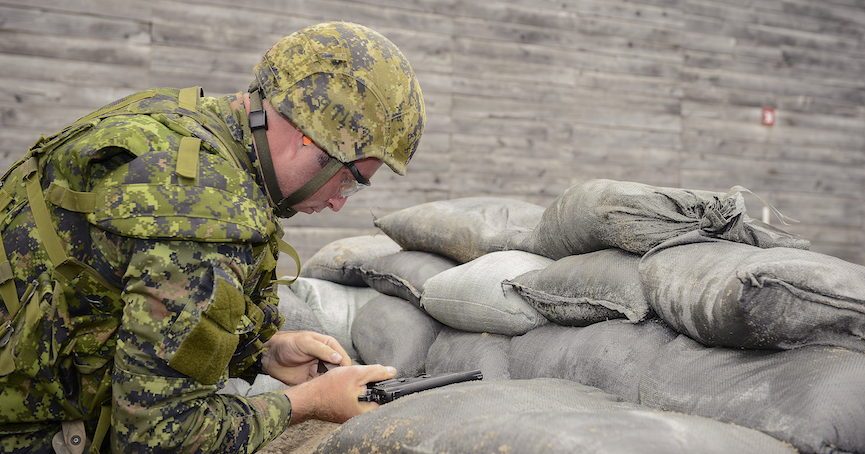The NDP hierarchy’s response to noted war hawk John McCain’s deathis shameful. Even worse, it reflects a general hostility towards the victims of Western imperialism.
After the U.S. Senator died over the weekend federal NDP leader Jagmeet Singh tweeted “John McCain had the courage not to stoop to divisive politics. He showed us that we can disagree in a way that creates dialogue and discussion, not fear and division. Rest In peace.”
Rachel Notley also praised a U.S, politician who never met a war he didn’t like. “As @BarackObama wrote today”, the leader of Alberta’s NDP Government noted,”all of us can aspire to the courage to put the greater good above our own. At John’s best, he showed us what that means.” In a follow-up tweet Notley called McCain “a true public servant.”
Even purportedly progressive Saskatchewan NDP leader Ryan Meili praised McCain on Twitter, saying “sad to hear of the passing of Sen. John McCain — a principled man who served his country with honour in difficult times.” (Meili at least had the sense to delete his tweet.)
Anyone who has any doubt about celebrating McCain should watch Rania Khalek’s video and, as Ben Saucier noted in a succinct rejoinder to Singh: “McCain heavily promoted the lies that led to the Iraq war. He championed the NATO bombing of Libya. He supported & armed the jihadists destroying Syria. He played a role in bringing neo-Nazis to power in Ukraine & backed Saudi Arabia’s genocide in Yemen. He was no hero.”
But, praising a man who rose to public attention by dropping bombs on civilian targets (a war crime) in North Vietnam is only part of the leadership’s whitewash of Western militarism. At the end of last month, Singh published a statement on Korean War Veterans Day “honouring the brave veterans of the Canadian army who fought valiantly during the Korean War, so that today, South Koreans can live in peace and prosperity.”
It’s absurd to imply the Korean War (1950-1953) was designed to secure “peace and prosperity” for South Koreans. About 27,000 Canadian troops and numerous warships expanded and internationalized a civil war that left as many as four million dead. They fought in support of Syngman Rhee’s brutal regime, which had killed tens of thousands in what Canadian diplomats in Washington described, in an internal cable to External Affairs at the time, as “a fair amount of repression by the Military Government of left-wing groups.” The understated diplomats added, “liberal social legislation had been definitely resisted.”
At the end of World War II, the Soviets occupied the northern part of Korea, which borders Russia. U.S. troops controlled the southern part of the country. According to Noam Chomsky,
when U.S. forces entered Korea in 1945, they dispersed the local popular government, consisting primarily of anti-fascists who resisted the Japanese, and inaugurated a brutal repression, using Japanese fascist police and Koreans who had collaborated with them during the Japanese occupation. About 100,000 people were murdered in South Korea prior to what we call the Korean War, including between 30,000 and 40,000 killed during the suppression of a peasant revolt in one small region, Cheju Island.
Singh’s Korean War Veterans Day statement concluded with a flourish of martial patriotism. “On this Korean War Veterans Day, let us also remember our current military personnel, and their families, who continue to fight every day to ensure that the values of peace, freedom, and democracy are defended around the world.”
Were the 385 Canadians sent to Sudan in 1884 to defend “peace, freedom, and democracy ” or to beat back indigenous forces seeking to wrest control of Khartoum from famed English General Charles Gordon? Or how about the 7,000 Canadians who fought in southern Africa between 1899 and 1902? Was that war about advancing Cecil Rhodes’ mining interests and strengthening Britain’s position in the region or “peace, freedom and democracy”?
World War I had no clear and compelling purpose other than rivalry between up-and-coming Germany and the lead imperial powers of the day, Britain and France. And 20,000 Iraqi troops and tens of thousands of civilians were killed during the Gulf War (1990-1991) to deepen the U.S. foothold in the region.
The 18 Canadian fighter jets that participated in NATO’s illegal bombing of Serbia in 1999 didn’t bring “peace, freedom, and democracy” there. Nor did the 40,000 Canadians who fought in Afghanistan, which remains wracked by violence. Seven years after Canada participated in NATO’s war in Libya, that country remains divided into various warring factions and hundreds of militias operate in the country of six million. (Canadian “peacekeepers” also helped overthrow Jean Bertrand Aristide’s elected government in Haiti and Congolese independence leader Patricia Lumumba.)
Canadian soldiers have only fought in one morally justifiable war, World War II. But, the historical record shows that Nazi expansionism’s threat to British interests, not opposition to fascism or anti-Semitism, led Ottawa to join WWII. (Only two years before the war Prime Minister Mackenzie King visited Hitler and in his diary King repeatedly expressed sympathy towards the Nazis.) As Jack Granatstein and Desmond Morton explain, “Canada went to war in September 1939 for the same reason as in 1914: because Britain went to war.”
Somebody should buy Jagmeet Singh a T-shirt that says: “I pissed on the world’s downtrodden to ingratiate myself with the mainstream establishment but all I got was this lousy shirt.”
Image: Canadian Armed Forces/Flickr
Like this article? rabble is reader-supported journalism.




